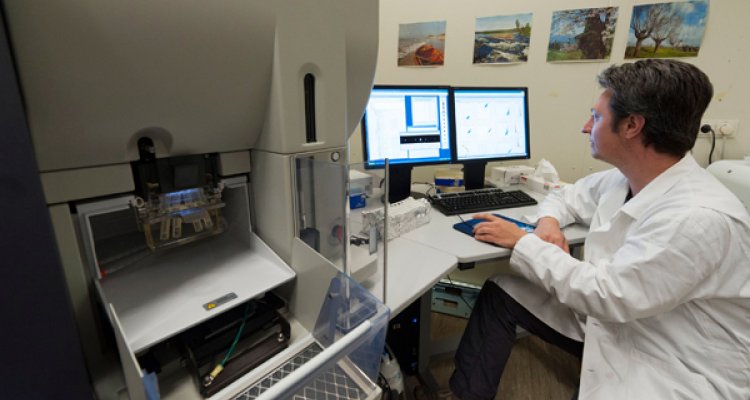
Equipment
Flow cytometry sorter - BD FACS AriaTM III
The BD FACS AriaTM III cell sorter has state-of-the-art technologies and superior multicolour performance, to achieve high sensitivity and resolution.
Flow cytometry is a technique to analyse single cells, organelles and other particles of a similar size. Fluorescence-activated cell sorting (FACS) is a specialized type of flow cytometry. It provides a method for sorting a heterogeneous mixture of biological cells into two or more containers, one cell at a time, based upon the specific light scattering and fluorescent characteristics of each cell. The instrument provides fast, objective and quantitative recording of signals from individual cells as well as physical separation of cells of particular interest. Flow cytometry can help studying a broad variety of biological parameters, for instance particle size, cell type, DNA and RNA content, enzymatic activity, antigens, cell pigments and apoptosis.
Technical details
- High resolution, sensitivity and reproducibility
- Detection of up to 15 parameters simultaneously
- Four different laser wavelengths at 405, 488, 561 and 633 nm
- Ceramic nozzles of 70, 85, 100 and 130 microns, for optimal sorting of cells and particles of different sizes
- Temperature control of the samples at either 4, 20, 37 or 42 °C
- Choice for 4-way or 2-way sorting in different sizes of tubes
- The Automatic Cell Deposition Unit enables sorting in 6, 24, 48, 96 and 384 well plates
Applications
Flow cytometry can be used in food industry, life sciences, medicine and diagnostics. It may provide valuable information in a wide range of research fields including microbiology, molecular biology, plant biology, pathology, immunology, haematology, marine biology and ecology.
More information can be found on the BD website.
In addition to the Flow cytometer, Wageningen University & Research, Shared Research Facilities offers the use of: